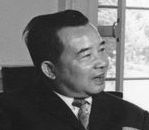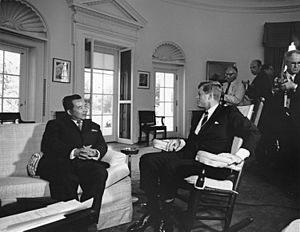Souvanna Phouma facts for kids
Quick facts for kids
Souvanna Phouma
|
|
|---|---|
|
ສຸວັນນະພູມາ
|
|
 |
|
| 7th Prime Minister of Laos | |
| In office 21 November 1951 – 20 October 1954 |
|
| Monarch | Sisavang Vong |
| Preceded by | Phoui Sananikone |
| Succeeded by | Katay Don Sasorith |
| In office 21 March 1956 – 17 August 1958 |
|
| Preceded by | Katay Don Sasorith |
| Succeeded by | Phoui Sananikone |
| In office 30 August 1960 – 13 December 1960 |
|
| Monarch | Sisavang Vatthana |
| Preceded by | Somsanith Vongkotrattana |
| Succeeded by | Boun Oum |
| In office 23 June 1962 – 2 December 1975 |
|
| Preceded by | Boun Oum |
| Succeeded by | Kaysone Phomvihane |
| Personal details | |
| Born | 7 October 1901 Luang Prabang, French Laos |
| Died | 10 January 1984 (aged 82) Vientiane, Laos |
| Political party | National Progressive Party Lao Neutralist Party |
| Spouse | Aline Claire Allard (1912–1977) |
Prince Souvanna Phouma (Lao: ສຸວັນນະພູມາ; 7 October 1901 – 10 January 1984) was an important political leader in Laos. He was the Prime Minister of the Kingdom of Laos many times. He led the "neutralist" group, which tried to stay out of conflicts.
Contents
Souvanna Phouma's Early Life
Souvanna Phouma was born in Luang Prabang, a city in Laos. His father, Bounkhong, was a very important leader, like a vice-king. Souvanna Phouma was also a nephew of King Sisavang Vong of Laos.
He received his education in France, studying in cities like Hanoi, Paris, and Grenoble. He earned degrees in architecture and engineering. In 1931, he returned to Laos. He married Aline Claire Allard, whose mother was Lao and father was French. He then started working for the government's Public Works Service.
Fighting for Independence
After World War II, Laos was under French control. Souvanna Phouma, along with his brother, Prince Phetsarath Rattanavongsa, and his half-brother, Prince Souphanouvong, joined a group called Lao Issara. This group, meaning "Free Laos," wanted to end French rule.
When the French took control of Laos again, Souvanna Phouma had to leave the country. He went to Bangkok, Thailand. But he came back to Laos in 1949. This was when France started to give Laos more freedom to govern itself.
Souvanna Phouma and his wife had four children. One of their daughters, Princess Moune, married an American diplomat.
Becoming a Leader in Laos
In 1951, Souvanna Phouma became the Prime Minister of Laos for the first time. His political party, the National Progressive Party, won many seats in the National Assembly. He served as Prime Minister until 1954.
Working for Peace in Laos
After new elections in 1955, Souvanna Phouma became Prime Minister again. He wanted to bring different groups in Laos together. In 1956, he made an agreement with the Pathet Lao. This was a communist group led by his half-brother, Souphanouvong. They agreed to form a "government of national union." This meant different groups would work together to lead the country.
In 1958, more elections were held. Parties connected to the Pathet Lao won more seats. Souphanouvong became the Economic Minister in the government. Another Pathet Lao leader, Phoumi Vongvichit, also became a minister.

Later in 1958, Souvanna Phouma had to step down as Prime Minister. This happened because of pressure from other political groups. The king then appointed a new temporary government. Souvanna Phouma was one of the "Three Princes" who tried to form a government that included all sides. However, these efforts did not last, and the Laotian Civil War began.
Souvanna Phouma was also elected as the President of the National Assembly from May to August in 1960. He served as Prime Minister again from 1962 until 1975.
See also
 In Spanish: Souvanna Phouma para niños
In Spanish: Souvanna Phouma para niños
 | George Robert Carruthers |
 | Patricia Bath |
 | Jan Ernst Matzeliger |
 | Alexander Miles |

